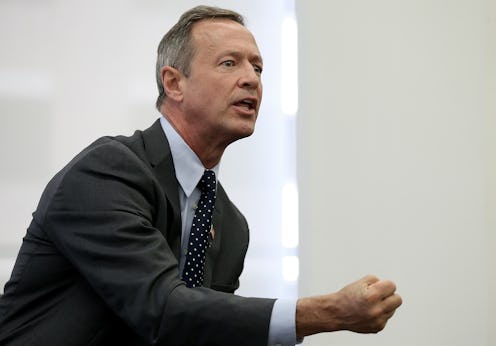News
8 Criminal Justice Issues O'Malley Is Right About
Protesters have demanded that politicians take a stand on social justice failures. On Friday, Martin O'Malley explained his criminal justice system plan. He hit a lot of key facets of the criminal justice system's shortcomings. Coming at crime through a social justice lens, O'Malley actually makes a lot of really good points.
The former Maryland governor spoke at the National Urban League conference to highlight his ideas on the subject. He also released a nine-page paper on criminal justice and gave an interview with Ebony Magazine that explained his reasoning and predicted the national response to such a plan.
Coming out with such an open-minded list of tactics to improve a failing criminal justice system was a smart idea for the O'Malley campaign. When protesters interrupted O'Malley at the Netroots Nation Conference in July, he faltered when he replied, "Black lives matter. White lives matter. All lives matter.” Many voters interpret "all lives matter" as a challenge to the popular "Black lives matter" campaign.
The incident put O'Malley on unsteady footing for the black vote, so releasing this plan was a good political strategy. And as much as American voters hate the idea of political games, that doesn't mean that his ideas are wrong. Here are eight points from O'Malley's plans that he's right about.
The Death Penalty Is Not A Good Idea
O'Malley worked to abolish the death penalty in Maryland, suggesting that it's something he might actually try to accomplish nationally. Besides the moral implications, numerous studies have shown that the death penalty is not cheaper than a life in prison and is not a successful deterrent against crime.
We Need Trust In The Police
Even if crime is down, a huge segment of the population fears and mistrusts the police system. Whether you think police officers are heroes or power-hungry officials, there's a problem here that won't resolve itself. O'Malley plans to target this with transparency and accountability in law enforcement by expanding mandated data reporting, creating a national use of force standard, utilizing technology such as body cameras, and expanding community involvement.
Marijuana Should Be Reclassified
Low-level drug crimes contribute to crowded prisons, unnecessary violence, and police bias. Whether or not you think recreational use should be legal, reclassifying marijuana as a Schedule II drug, rather than its current status as a Schedule 1 drug (which comes with harsher punishments and a higher potential for abuse), would be a start toward a fairer criminal justice system.
Private Prisons Should Not Exist
According to the American Civil Liberties Union, private prisons account for six percent of American prisons and have been linked with violence and poor conditions. They often lobby for harsh sentencing.
The Immigration System Is Not Working
According to the Department of Justice, immigration cases made up 40 percent of federal prosecutions in 2012. O'Malley wants to use detention as a last resort and stop local officers from having so much jurisdiction over immigration enforcement, which would theoretically cut back on racial profiling.
We're Failing At Addiction And Mental Illness
There are serious flaws in the way the American criminal justice system handles people who struggle with addiction and mental illness. O'Malley wants to reinvest in addiction facilities and mental healthcare to unburden the criminal justice system. He says he would also train law enforcement officers to serve people in crisis, rather than throwing them into a system that doesn't help them.
There's A Criminal Justice Problem In Schools
The way students are disciplined often involves discrimination that follows them for life. As education budgets tighten, school staffs don't have as much room for counselors and special educators, increasing the disciplinary action that especially targets minority students.
Economic Inequality Slashes Too Deep
Part of O'Malley's plan is to combat inequality by stopping the college debt crisis, supporting universal child care, and providing immigration reform. In 2012, the richest one percent of Americans owned 20 percent of the nation's wealth, according to an economic study by Emmanuel Saez and Gabriel Zucman. Even the most fiscally conservative Republicans have to admit that there has to be a way to make things fairer than that.
Images: Getty Images (9)
